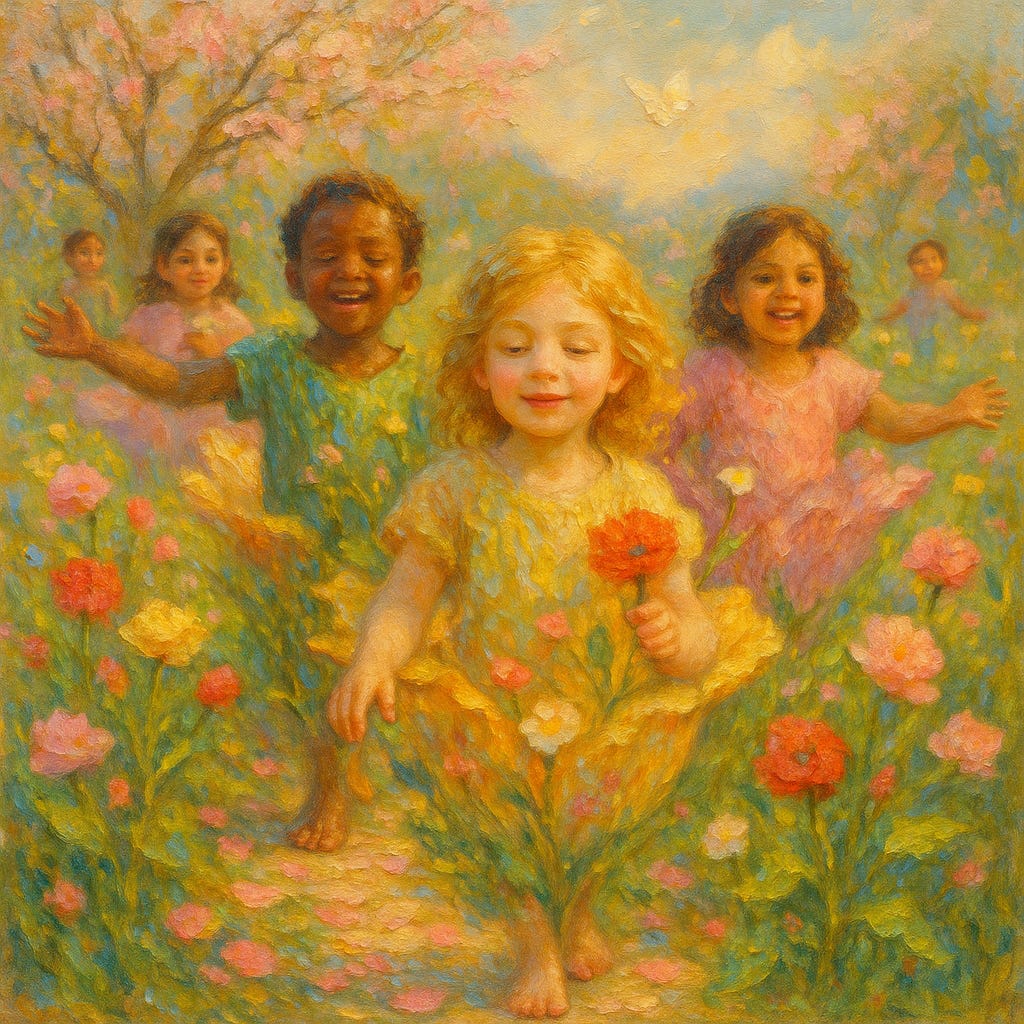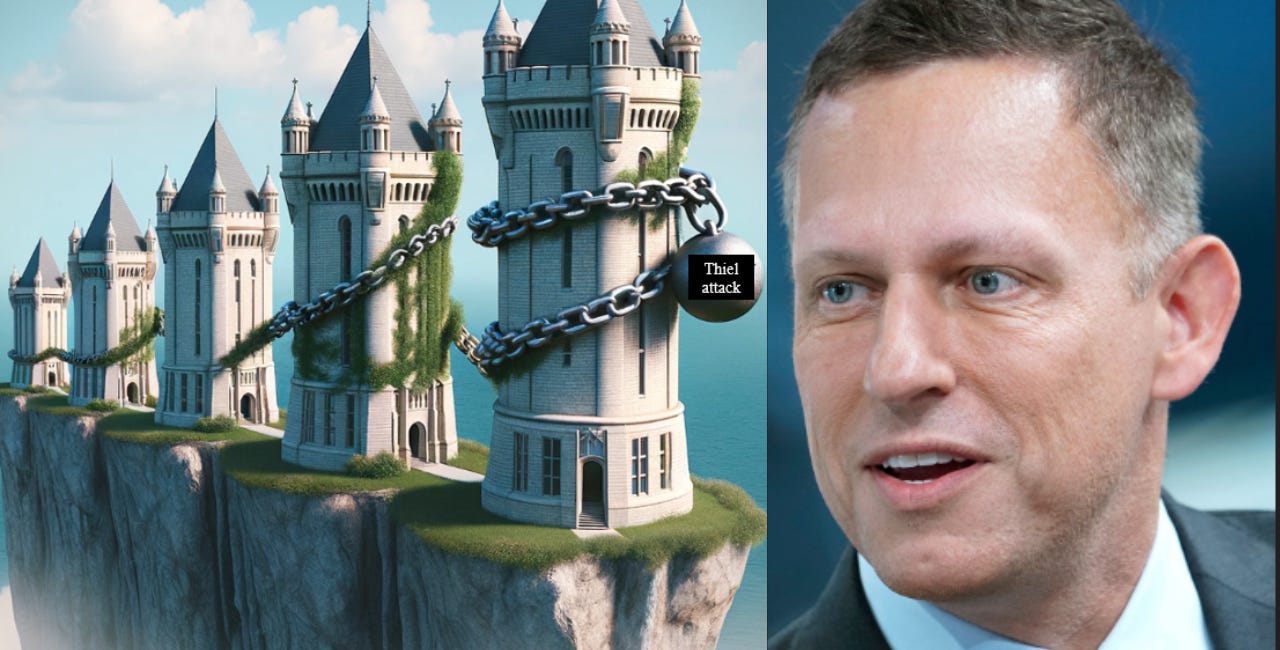The way to solve education: Let children blossom into who they are
Adults don't have "authority" over children
~5 months ago, I gave birth to an angel. As you can tell from my writing, I love the topic of education, and naturally had many thoughts on how to raise her even before she was born. Homeschooling, tutoring, helping her question ideas, interest-based learning, raising her as a genius - all these ideas floated in my head.
Yet, as I watch her grow and take on a personality of her own, it strikes me that all my ideas are flawed if I can’t practice the most important philosophy that education should rest on: The philosophy of allowing each child (and indeed person) to become who they are.
The most important philosophy in education should be to respect human freedom and flourishing, including that of children. If we can truly honor this, I think we can solve the majority of the problems in education. And I don’t mean it hyperbolically.
Children aren’t pieces of clay
Each person is unique with their own set of ideas. They are their own individual. As much as it’s hard for us to see, this applies to children too. Children aren’t pieces of clay who need to be molded by parents and / or the education system.
It sounds trivial and obvious when put this way, yet it’s notoriously hard to practice, since parents, teachers, and adults are constantly thrusting their own ideas and dreams onto children.
The reason parenting can become a controversial topic is because each parent thinks they have authority over their child and gets to decide how to manage their child’s time and energy. Every parent seems to have some opinion on raising their kids, which could be as well-natured as “I want them to be good humans” to tiger mom parenting, “I want them to go to an Ivy league.”
No individual has “authority” over any other individual. This is the basic premise that parenting and the education system does not understand. The ideas of freedom and liberty are somehow thrown out the door when raising children. Parents fail to respect the human they gave birth to.
Respecting your child still requires parental duties
Respecting your child’s individuality does not mean that parents shun all their duties towards children. They still need to provide for the safety and well-being of their child. When one signs up to be a parent, they sign up for certain duties that come with it - mainly the duty of caring for your child at least till they are able to fend for themselves. However, this duty does not give them the power to control1 their kids or to project their ideas onto their kids.
Marriage is a good analogy. When one marries someone, it comes with certain duties - honesty, loyalty, agreement on finances, child rearing, and so on. You can’t simply do only what you want, you need to honor the bond. However, it doesn’t mean that either spouse controls the other. It’s a bond where you respect each person and you respect the bond.
In raising children, we fail to respect the child. We demand that the child respect us simply because we are older than them. But what about us respecting the child?2
But shouldn’t parents share their knowledge?
Some might question and ask: “As a parent or teacher, I have acquired more knowledge over the years, so shouldn’t I be sharing that with my kids?”
You absolutely should. Discussing your ideas with your kids is not the same as forcing your ideas onto them, the latter of which is what adults try to do when they set rules for kids. The distinction is simple to understand when you replace the parent-child relationship with any adult-adult relationship. As adults, we discuss our ideas with others, but we don’t tend to force them on others, no matter how close the relationship. In any case, trying to force your ideas onto someone doesn’t work - adoption only happens when the person listening to the ideas is receptive to them. In fact, trying to force your ideas onto someone merely ruins the relationship.
Another question that might come up: “Doesn’t this parenting style of letting your child be sound a little negligent?” Quite the contrary. The philosophy of respecting my child is not the same as hands-off parenting. It requires a ton of creativity and problem-solving on my part to help her explore her own set of ideas. It’s far easier for me to manage her time in a manner that would be convenient for me - put her in the school system, add on extracurriculars that I think would be useful, discipline her in ways that are suited to my schedule. But all of these actions would be for the convenience of me as the parent, not because my child wants to go to school or do the activities I throw onto her plate. Instead, giving her the freedom to craft her time the way she wants requires creativity and work for both the parent and the child. But how can I not help her explore this gift of personhood?
To Be One with the Universe
This is not a note criticizing any parent or “parenting philosophy.” I think most parents are super-heroes - caring for a child is not easy. Yet, caring for a child is not the same as projecting our own fantasies and desires onto our child.
I understand where this projection comes from. As a new mom, I too was filled with hopes and fantasies for my little one. Nothing better than the reality of watching her blossom into her own self to squash these desires. I’d hate to quench her own personhood by projecting my ideas onto her.
So, this post is mostly a note to myself - that as I watch my daughter grow, let me not project my desires onto her. I just want her to be who she is. To blossom into her own self. And to give her the freedom and space to be one with the universe. For what’s a greater joy than living a life true to who you are?
The Prison: Nietzsche Philosophy on How to Be Yourself
I stole a glance at Daniel’s papers. It was study time, which meant only hushed whispering for the next hour, and pin drop silence if Mr. Dey was the supervisor. Daniel intrigued me; he was certainly an outlier among us jail inmates. No one quite knew the true story behind what landed him in prison, but here we were, about to spend the next two months t…
I recognize that many parents will be offended by the use of the word control. Yet, when parents say things like “You have to follow my rules, you live in my house” or “Just do as I say, I am your mother,” this is indeed a form of control. Many parents might not be extreme about it, but most parents tend to control their kids, albeit in subtle ways. Disciplining your child is a form of control.
Some parents will read this and balk at this statement, thinking that they do or did respect their children growing up. This is not black or white. Parents can in many instances respect their child, and in many others demand that their child listen to them without any discussion, a version of not respecting the child.




